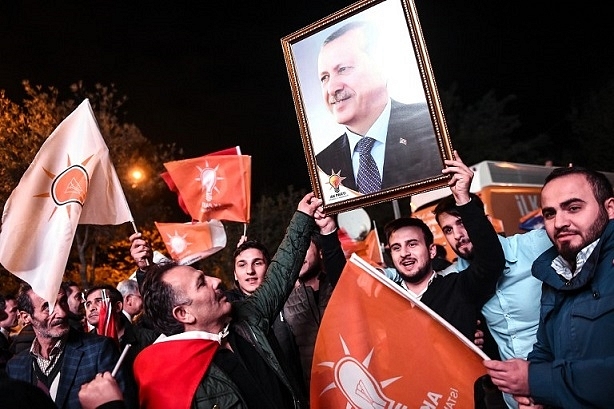
The Turkish Voter Surprises Everyone With Erdogan's Victory – More Of The Same?
In which direction is Turkey under Erdogan heading after the massive victory of the Justice and Welfare Party (AKP) in the polls?
In a result that surprised virtually everybody, the Turkish people voted decisively to give the Justice and Welfare Party (AKP – its Turkish acronym) an outright majority sufficient to let the party rule on its own. So, it must be acknowledged that President Recep Tayyip Erdogan is most likely right in his statement-
…the final decisive factor in our political world is the national will, and yesterday on 1 November, the national will favoured stability.
That seems exactly to be what the Turkish people have done. Since the last attempt at gauging their will, in June, the country has seen a number of terrorist strikes, increased violence and uncertainty close to its borders (including in south-eastern Turkey’s Kurdish zones), and a generally uneasy economic situation. It should have been no surprise that people voted for a return to stability, though at least one prominent European television news channel claimed the results came as a surprise even to the AKP. It certainly was a surprise to this writer, who was not quite ready in June to bet on an AKP victory.
Curiously though, the democratic process in Turkey has gotten a thumbs-down from European observers. According to Andreas Gross, the Swiss head of the mission representing the parliamentary assembly of the Council of Europe (Pace):
This campaign was unfair and characterised by too much violence and fear.
There is some truth to that, in that journalists were intimidated, assaulted even – which the government attributed to part of an ongoing white-collar criminal investigation rather than political vendetta. On the other hand it must also be acknowledged that there was strong criticism in the media of Erdogan and the AKP through these months leading up to the latest polls. So it is safe to assume that the farcical pomposity of Gross – who stated that “he (i.e. Erdogan) has to unite again what has been divided in the last five months” – will more likely be ridiculed in Turkey, than respected (if anyone pays enough attention, that is).
Still, the low-pitched whine from the European guardians of democracy may be expected to continue for a while longer. And comically ineffectual though it is, one must also acknowledge that there is some validity to that improperly expressed concern. Observe, if you will, that the problem with the Erdogan government is not so much a lack of commitment to democracy, but rather a lack of prudence when it comes to both internal and external policies – stemming from an inaccurate assessment of the country’s strategic strength and internal cohesion, combined with a slightly worrying tendency towards violent knee-jerk reaction.
It may be argued that, such behavior is largely because of the European Union’s failure to integrate Turkey into its membership after promising to do so, a mistake the Europeans should never have made in the first place. But that was a different time then, when the Cold War was threatening to freeze over into nuclear conflict, when secular Kemalism was in full bloom in Turkey, and when a more cohesive EU paid greater attention to American nudges.
Things have changed. Realistically speaking, today the prospect of Turkey joining the EU is zero (purists will say it was never higher than that). This is because Turkey is not quite the democracy that the European Union thinks its member states ought to be. It’s government is a little more rough hewn than even the East European members (which is grating enough), its military is a touch too talkative, police forces a bit too heavy handed, and it is a Muslim country (but don’t expect the delicate diplomats of the EU to ever say that in public).
So where is Turkey under Erdogan headed? Possibly towards more of the same; that is to say internal policies that will likely exacerbate divisions between the Kemalist loyalists and the Ottoman nostalgists, between the Turks and the Kurds, and between those who favour closer integration with Europe and those who would rather look eastwards at Islam-tinted memories of erstwhile glory. On the external front, Turkey is now irretrievably engaged in Syria and Iraq and it will likely be pulled into those conflicts in a slow but inexorable process, which is not certain to work towards its economic or strategic benefit.
There are complicated and difficult years ahead for the Erdogan government, and for Turkey itself. But these days, countries that don’t face complicated and difficult years ahead are few and far between. One thing no one can deny: Erdogan is as sharp and savvy a politician as one can find, anywhere in the world. And judging by his electoral and political success, he appears to have a very sensitive digit on the pulse of the Turkish public. The world must give him the benefit of the doubt that the Turkish public has and assume that, as of now, if anyone can guide Turkey through the troubling times ahead, he can.